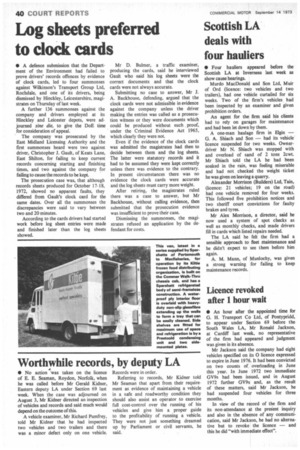Log sheets preferred to clock cards
Page 42

If you've noticed an error in this article please click here to report it so we can fix it.
• A defence submission that the Department of the Environment had failed to prove drivers' records offences by evidence of clock cards, led to four summonses against Wilkinson's Transport Group Ltd, Rochdale, and one of its drivers, being dismissed by Hinckley, Leicestershire, magistrates on Thursday of last week.
A further 136 summonses against the company and drivers employed at its Hinckley and Leicester depots, were adjourned sine die, to give the DoE time for consideration of appeal.
The company was prosecuted by the East Midland Licensing Authority and the first summonses heard were two against driver, Christopher J. Gault, of Keats Lane, East Shilton. for failing to keep current records concerning starting and finishing times, and two against the company for failing to cause the records to be kept.
The prosecution case was, that although records sheets produced for October 17-18, 1972, showed no apparent faults, they differed from Gault's clock card for the same dates. Over all the summonses the discrepancies were said to vary between two and 20 minutes.
According to the cards drivers had started work before log sheet entries were made and finished later than the log sheets showed. Mr D. Bulmer, a traffic examiner, producing the cards, said he interviewed Gault who said his log sheets were the correct documents and that the clock cards were not always accurate.
Submitting no case to answer, Mr J. A. Backhouse, defending, argued that the clock cards were not admissible in evidence against the company unless the driver making the entries was called as a prosecution witness or they were documents which could be produced without such proof, under the Criminal Evidence Act 1965, which clearly they were not.
Even if the evidence of the clock cards was admitted the magistrates had then to decide between them and the log sheets. The latter were statutory records and it had to be assumed they were kept correctly unless there was evidence to the contrary. In present circumstances there was no evidence the clock cards were accurate and the log sheets must carry more weight.
After retiring, the magistrates ruled there was a case to answer, but Mr Backhouse, without calling evidence, then submitted that the prosecution evidence was insufficient to prove their case.
Dismissing the summonses, the magistrates refused an application by the defendant for costs.




































































































































